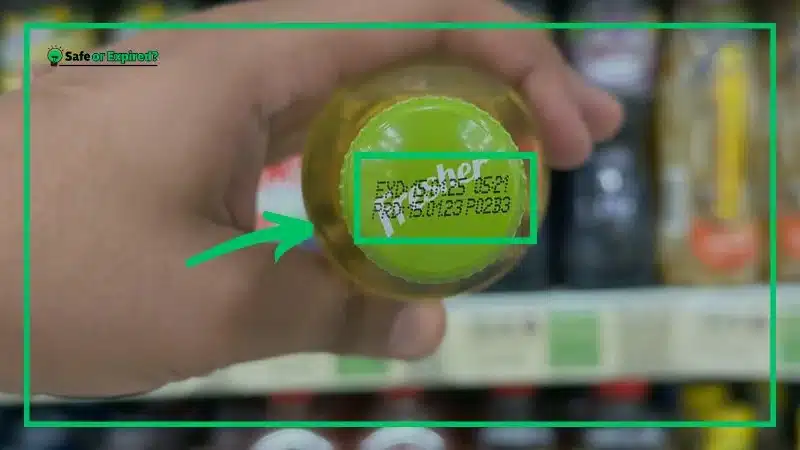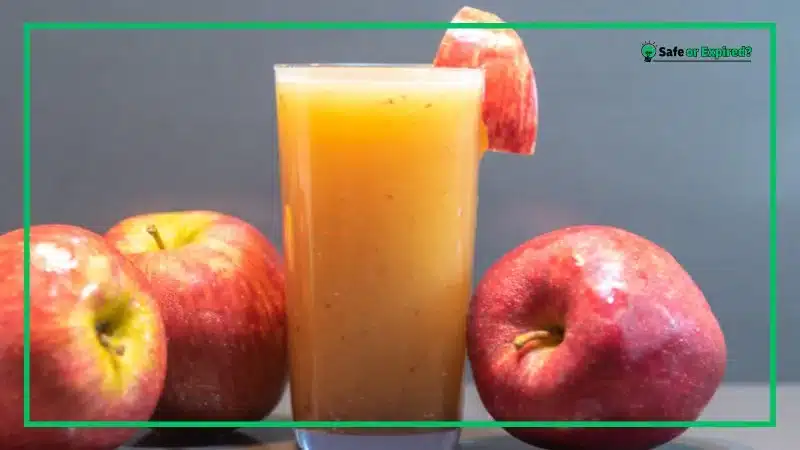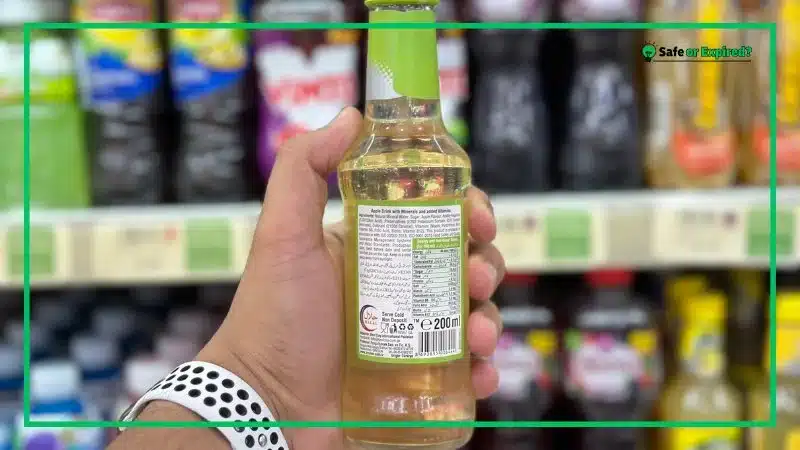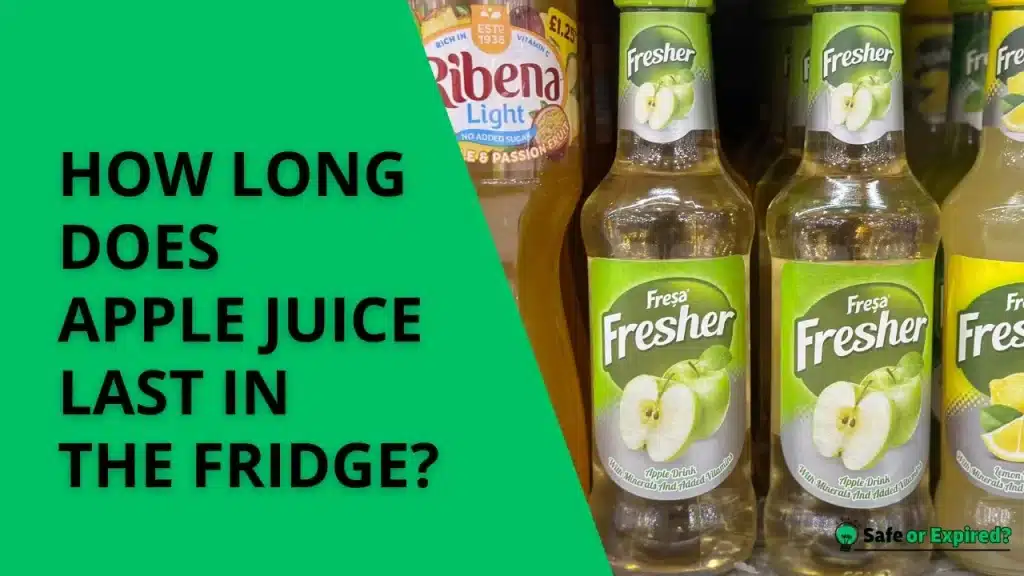“How long does apple juice last in the fridge?” is a critical consideration for families with children. Well, it can stay good for up to 10 days (but the exact shelf life varies).
Don’t worry; we’ll dive into not just the timelines but also the best storage methods to keep your juice tasting great. So, stick to the end.
How Long Does Apple Juice Last in the Fridge? Deadline
Apple juice typically lasts in the fridge for about 10 days past the printed expiration date. Once opened, it should be consumed within a week if you want to enjoy freshness and quality. However, always check for any signs of spoilage, such as odor or taste, before consuming.
Moreover, it’s better to drink apple juice within the best-by or expiry date.

But what about “How long does fresh apple juice last in the fridge?” Fresh apple juice, due to the absence of preservatives, is best if consumed within 2-3 days when stored in the refrigerator. It’s important to drink it quickly to maintain its freshness and nutritional value.
Similarly, people also ask, “How long does homemade apple juice last in the fridge?” Homemade apple juice typically lasts about 3-5 days. Proper storage is crucial to minimizing spoilage and maintaining its best quality.
Now, let’s answer some other important apple juice queries.
How Long Does Apple Juice Last Unopened in the Fridge?
Unopened apple juice can last significantly longer in the fridge, typically up to 8-12 months. This extended shelf life is due to the pasteurization process and airtight packaging that prevents spoilage. Furthermore, refrigeration further slows down any degradation processes, helping preserve the juice’s flavor, color, and nutritional value for an extended period.

How Long Does Apple Juice Last After Opening in the Fridge?
Once opened, you should drink apple juice within 5-7 days when stored in the fridge. This ensures the best taste and nutritional quality before it begins to degrade. After opening, apple juice is exposed to air, which introduces bacteria and yeast that can start the fermentation process.

Note that refrigeration slows this process, but it cannot stop it completely. To maintain its freshness and prevent spoilage, it’s essential to keep opened apple juice refrigerated and tightly sealed.
How Long Is Apple Juice Good for After Opening Unrefrigerated?
Apple juice should be consumed within 2 hours after opening if left unrefrigerated. Beyond this, the risk of bacterial attack and spoilage increases significantly. Understandably, this makes juice unsafe to drink. Moreover, leaving apple juice unrefrigerated after opening exposes it to ambient temperatures, which can also cause spoilage.
How Long Is Apple Juice Good For After Expiration Date?
Commercially packaged apple juice can often be safe to consume up to 3-6 months past its expiration date if unopened and stored properly. However, it’s important to check for signs of spoilage, like off smells or cloudiness, before consumption.
The expiration date on apple juice typically indicates the manufacturer’s estimate of when the product (juice) will start to decline in quality. While unopened apple juice can remain safe beyond this date under ideal storage conditions, its quality in terms of taste, color, and nutrient content may diminish over time. Always inspect the juice for any signs of spoilage before drinking.
Apple Juice Shelf Life: Comparison of Popular Brands
Popular brands of apple juice vary in shelf life. Mott’s can last 7-10 days refrigerated after opening, while Tropicana lasts about seven days. Organic brands like Apple & Eve offer a slightly shorter fridge life of 5-7 days due to fewer preservatives.
Here’s the shelf life for each brand:
- Mott’s Apple Juice: Ever wondered, “How long does Mott’s apple juice last after opening?” Mott’s apple juice should ideally be consumed within 7-10 days if kept refrigerated. This timeframe helps maintain its optimal flavor and freshness.
- Tropicana Apple Juice: Similar to Mott’s, Tropicana is designed to last about seven days in the fridge after opening. Without refrigeration, it should be consumed immediately, within 2 hours.
- Apple & Eve: This organic apple juice contains no added preservatives, which shortens its refrigerator shelf life to 5-7 days after opening. It should also be consumed within 2 hours if left out of the fridge.
Check out this shelf life table of each apple juice (Fridge vs Counter):
| Brand | Shelf Life in Fridge (After Opening) | Shelf Life on Counter (After Opening) |
| Mott’s | 7-10 days | 2 hours |
| Tropicana | 7 days | 2 hours |
| Apple & Eve | 5-7 days | 2 hours |
How to Properly Store Apple Juice in the Fridge? Keep It Fresh
To keep apple juice fresh in the fridge, store it in its original container, ensure the cap is tightly sealed, and place it in the main body of the fridge rather than the door, where temperatures are more consistent.
Use the Original Container
When you buy apple juice, it comes in a specially designed container that helps keep it fresh. Whether it’s a plastic bottle or a carton, these containers are made to protect the juice from air and light, which can make it go bad faster.
After you pour some juice, make sure you close the container tightly. This helps to keep out any air that might spoil the juice. If the original container is damaged or can’t be resealed, pour the juice into a clean, airtight container.
Keep the Cap Tightly Sealed
One simple but important food safety guideline for keeping apple juice fresh is to always make sure the cap is tightly sealed after each use. This prevents air from entering the container. Air can carry germs and also speed up the oxidation process, which affects the taste and safety of the juice.
By keeping the cap tight, you’re locking in freshness and keeping out unwanted particles that could spoil your juice.
To effectively prevent food from spoiling, it’s crucial to understand why it happens in the first place. Discover the main reasons and how to avoid them in “Understanding Food Spoilage: 13 Causes and Solutions.”
Store Away from the Fridge Door
A lot of us might put drinks in the fridge door because it’s easy to reach, but this isn’t the best spot for things that need to stay really cold, like apple juice. The temperature in the fridge door can change a lot because it gets warm every time the door is opened. Instead, place your apple juice in the main part of the fridge, where the temperature stays more consistent.
This helps to keep your juice tasting fresh and good for longer.
Many ideas about how to store food are based on outdated or incorrect information. Clarify these misconceptions by checking out “Exposing Common Food Preservation Myths.”
Monitor Juice Clarity and Smell
Regularly check the clarity and smell of your apple juice. Any signs of cloudiness, sediment, or an off smell can indicate that the juice is starting to go bad. Fresh apple juice should be relatively clear and have a crisp, sweet aroma.
If you notice any sour or fermented smells, or if the juice becomes murky, it’s best to discard it to avoid consuming spoiled or contaminated juice.
Use Within Recommended Time
Even with optimal storage, it’s important to consume apple juice within the manufacturer’s recommended timeframe — usually within 7 to 10 days after opening. This ensures you’re enjoying the juice when it’s at its best quality.
Mark the date on the container when you open the juice to keep track of how long it’s been stored. Consuming the juice within this period minimizes the risk of spoilage and maintains the nutritional benefits.
What Happens if You Drink Expired Apple Juice?
Drinking expired apple juice can lead to foodborne illness, especially if it shows signs of spoilage such as an off smell, taste, or appearance. Symptoms may include stomach upset, nausea, vomiting, and diarrhea.
These are the risks of drinking expired apple juice.
Foodborne Illness
Consuming expired apple juice can expose you to harmful bacteria like Salmonella, which thrive in spoiled juice. These bacteria can cause food poisoning. You may face symptoms such as stomach cramps and vomiting.
Nutritional Degradation
Over time, the nutritional value of apple juice diminishes. Vitamins such as vitamin C naturally degrade when exposed to air, light, or heat, even if the juice doesn’t show visible signs of spoilage.
Drinking expired apple juice means you might not be getting the vitamins you think you are, reducing the health benefits of drinking the juice.
You can check the nutritional value of apple juice on the bottle:

Unpleasant Taste and Odor
Expired apple juice often develops an unpleasant taste and odor. These changes are not just unappetizing but also indicators that the juice’s quality has deteriorated.
Fermentation
Expired juice can start to ferment, leading to the production of alcohol and carbonation. While the alcohol content is usually very low, the taste and texture of the juice will change significantly. In some cases, the internal pressure from fermentation can cause the container to bulge, which is a clear sign that the juice should not be consumed.
By understanding these risks, you can better appreciate the importance of checking expiration dates and ensuring proper storage of apple juice to avoid any negative health effects.
What To Do With Expired Apple Juice? Easy tips
If you discover expired apple juice in your pantry, don’t rush to pour it down the drain. There are several creative and safe ways to repurpose it, depending on its condition and signs of spoilage.
Here are the creative uses for expired apple juice:
Cooking and Baking
Expired apple juice that hasn’t shown signs of spoilage (like mold or an off smell) can still be used in cooking and baking. Use it as a liquid ingredient in recipes for muffins, bread, or pancakes. It can also add a sweet note to marinades or glazes for meats, enhancing flavors with its natural fruit sugars.
Garden Compost
If the apple juice is too far gone to consume or use in cooking, consider adding it to your compost pile. The natural sugars in the juice will attract beneficial bacteria. This bacteria can speed up the decomposition process, enriching your compost with nutrients that are excellent for garden soil.
Cleaning Agent
Apple juice contains acids that can act as mild cleaning agents. Dilute expired apple juice with water and use it to clean windows or glass surfaces. The acidic properties help remove dirt and grime, leaving a streak-free shine.
Plant Fertilizer
Diluted apple juice can be used as a natural fertilizer for acid-loving plants like blueberries. The slight acidity and sugar content can help nourish the plants and promote growth. However, use this sparingly to avoid attracting pests or causing mold growth.
Craft Projects
Expired apple juice can be used in various craft projects, especially for kids. Use it as a dye for paper or fabrics to create natural, earthy tones. It’s a fun way to engage children in arts and crafts while teaching them about recycling and repurposing.
By utilizing these suggestions, you can ensure that expired apple juice doesn’t go to waste, contributing to a more sustainable household while still making the most out of every purchase.
Conclusion
Understanding the shelf life of apple juice in the fridge helps you enjoy every sip at its best. Here are the key takeaways:
- Store-bought apple juice can last 7-10 days in the fridge once opened.
- Homemade apple juice should ideally be consumed within 3-5 days.
- Keeping the juice in its original container and ensuring it is tightly sealed will extend its freshness.
- Store the juice in the main body of the fridge, not in the door, to maintain a consistent temperature.
- Enjoy your apple juice while it’s fresh, and remember these tips to maximize its shelf life and flavor!
With these guidelines, you’re all set to manage your apple juice like a pro and make the most of your refreshing drink.

